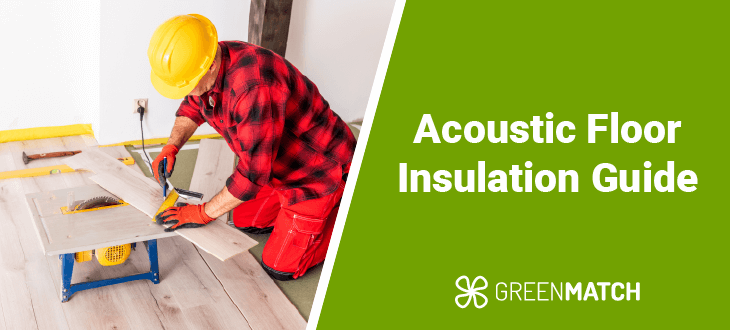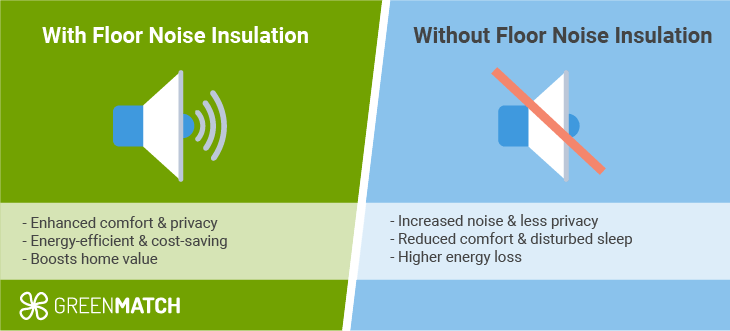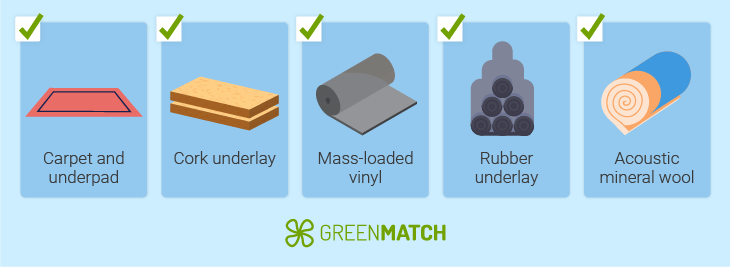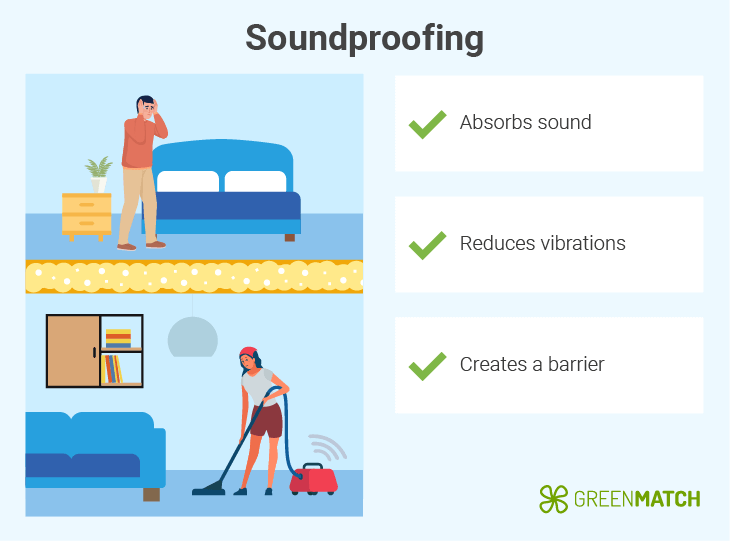Answer these simple questions and we will find you the BEST prices
Which type of solar quotes do you need?
It only takes 30 seconds
100% free with no obligation

Get Free quotes from insulation specialists near you

Save money by comparing quotes and choosing the most competitive offer

The service is 100% free and with no obligation
- GreenMatch
- Insulation
- Floor Insulation
- Acoustic Floor Insulation
Acoustic Floor Insulation in the UK: Is it Worth it in 2025?


- Acoustic floor insulation enhances comfort and makes your property more appealing, especially to buyers in noise-sensitive areas.
- Sound insulating your floors can lead to energy bills savings of £70–£110 annually.
- Acoustic insulation materials cost between £5–£30 per m², and daily labour rates average £240–£350.
As more people seek quieter spaces, acoustic floor insulation has become a smart choice for UK homeowners. Over 50% of UK residents prioritise noise reduction when renovating, highlighting the value of soundproofing for a peaceful home. Floor insulation can transform your space with benefits from noise reduction to energy savings.
In this guide, we'll explore everything you need to know about acoustic floor insulation, including costs, top materials, and key benefits, to help you decide if it's worth the investment in 2025.
Are you looking to insulate your floors but don’t know where to begin? Let us make it easy for you. Skip the hassle of searching for installers—just take 30 seconds to fill out our quick form, and we'll provide you with up to 3 free, customised quotes from trusted professionals in our network. Click below to get started!
- Describe your needs
- Get free quotes
- Choose the best offer
It only takes 30 seconds



How does sound insulation between floors work?
Sound insulation between floors blocks or absorbs unwanted noise, creating quieter, more comfortable spaces—especially useful in multi-level homes or offices. Here’s how it works and why it’s valuable:
- Absorbing sound: Acoustic floor insulation traps airborne sounds like voices or music, reducing noise transfer between floors.
- Reducing vibrations: Materials like floor noise insulation dampen impact sounds (e.g., footsteps), minimising vibrations that travel through floors.
- Creating a barrier: Underfloor sound insulation “decouples” flooring layers, breaking direct sound paths and effectively blocking noise.
Why invest in floor sound insulation?

- Enhanced comfort: Acoustic insulation creates a peaceful, private environment, blocking distracting sounds from above or below.
- Energy efficiency: Sound insulation materials often possess thermal properties, helping regulate room temperature. This reduces heating and cooling costs and makes spaces more energy-efficient. For example, floor insulation can reduce heat loss and save between £70 to £110 annually on heating costs, according to the Energy Savings Trust. Over ten years, this amounts to £700 to £1,100, making it a valuable investment in savings and comfort.
- Higher property value: In areas where quiet is a priority, soundproofing between floors adds value, making properties more attractive to buyers.
- Compliance with building regulations: In many areas, floor sound insulation between floors is required to meet building regulations, especially in multi-unit buildings.
Best materials for acoustic floor insulation

Selecting the right material for sound insulation between floors depends on the type of noise, budget, and installation requirements. Here’s an overview of some top choices that will result in the best floor insulation.
| Material | Sound reduction (Decibels) |
|---|---|
| Carpet and underpad | Up to 25 dB |
| Cork underlay | Up to 30 dB |
| Mass-loaded vinyl (MLV) | Up to 30-40 dB |
| Rubber underlay | Up to 50 dB |
| Acoustic mineral wool | Up to 60 dB |
Acoustic mineral wool
This high-density insulation material is widely used for soundproofing due to its superior ability to absorb sound waves, making it ideal for impact and airborne noise.
Pros
- Excellent at absorbing both airborne and impact noise.
- Cost-effective and efficient for high-performance sound insulation.
Cons
- Requires protective layers to prevent fibre shedding.
- Installation can be tricky in certain flooring types.
Rubber underlay
Rubber underlay is known for its density and durability, making it an effective choice for reducing impact noise, such as footsteps, in high-traffic areas.
Pros
- Highly effective for impact noise reduction, ideal for high-traffic areas.
- Durable and resistant to wear, with a good lifespan.
Cons
- More expensive compared to other materials.
- Adds height to the floor, which might require adjustments.
Mass-loaded vinyl (MLV)
MLV is a flexible, high-density material that acts as a barrier to airborne and impact noise. It is often used in combination with other soundproofing layers.
Pros
- Flexible and effective for both airborne and impact sound insulation.
- Suitable for layering with other materials for enhanced noise reduction.
Cons
- Heavy and can be challenging to install over large areas.
- It is more costly than other basic soundproofing options.
Carpet and underpad
Carpet combined with an underpad is a traditional sound insulation choice. It provides basic sound dampening for residential spaces, particularly against impact noise.
Pros
- Affordable and easy to install, often suitable for residential use.
- It helps with minor impact noise and adds comfort.
Cons
- It is less effective than dedicated acoustic materials, especially for airborne noise.
- Needs frequent replacement in high-traffic areas.
Cork underlay
Cork underlay is eco-friendly and naturally sound-absorbent. It provides moderate sound insulation and is ideal for homes looking for sustainable options.
Pros
- Eco-friendly, with natural sound-absorbing properties.
- It is effective for moderate noise reduction and adds warmth to flooring.
Cons
- Not suitable for areas with heavy impact noise.
- It can be less effective for airborne noise than denser materials like mineral wool.
How much does floor sound insulation cost?
Floor sound insulation costs range from £225–£1,350 for a 45m² room and £375–£2,250 for a 75m² space. Here’s a quick breakdown of popular materials and their costs per square metre to help you plan for your insulation needs.
| Material | Cost per m² | Cost for 45 m² | Cost for 75 m² |
|---|---|---|---|
| Carpet and underpad | £5 - £15 | £225 - £675 | £375 - £1,125 |
| Acoustic mineral wool | £12 - £18 | £540 - £810 | £900 - £1,350 |
| MLV | £15 - £25 | £675 - £1,125 | £1,125 - £1,875 |
| Rubber underlay | £15 - £30 | £675 - £1,350 | £1,125 - £2,250 |
| Cork underlay | £17 - £22 | £765 - £990 | £1,275 - £1,650 |
Regarding labour costs, professionals typically charge around £240 - £350 per day (including VAT) for soundproof floor insulation, with rates varying by region. Expect higher rates in London and the Southeast, reflecting local living costs.
Labour costs may increase if the job involves moving radiators, adjusting skirting boards, or making other modifications, as these add complexity and time. These estimates give a helpful guide, but a custom quote is always more precise.
Take the next step to get accurate, personalised quotes—simply fill out our quick form to receive up to 3 free quotes from accredited local professionals. Click below to get started!
- Describe your needs
- Get free quotes
- Choose the best offer
It only takes 30 seconds



How to soundproof floors?
Effective sound insulation between floors transforms noisy spaces into calm, comfortable areas. Here’s how to install soundproof floor insulation efficiently:
- Choose the right materials: Select materials that suit your needs and budget.
- Prepare the floor: Clean the floor and seal any gaps with acoustic sealant for a solid, soundproof base.
- Lay underlay: Roll out rubber or cork underlay for impact sound absorption—tape seams to keep it secure.
- Add an MLV layer (optional): Layer MLV over the underlay to improve sound insulation for floors, particularly against airborne noise. Seal edges to prevent sound leaks.
- Install acoustic mineral wool in the subfloor: Place acoustic mineral wool between floor joists for added sound insulation between floors. This step is particularly effective in multi-level homes.
- Lay the final flooring: Install your final flooring over the insulation layers. Carpets and underpads add an extra level of acoustic floor insulation.
- Seal gaps and edges: Finish by sealing around the edges and gaps with acoustic sealant for complete soundproof insulation for floors.
While DIY is possible, achieving effective sound insulation between floors can be challenging without professional help. Avoid the risk of gaps, poor soundproofing, or materials that don’t entirely block noise.
Is floor noise insulation worth it?
Sound insulation between floors isn’t just about reducing noise; it’s a wise investment in your home’s comfort, privacy, and value. With suitable insulation materials and correct installation, floor sound insulation transforms noisy spaces into peaceful environments, saves energy costs, and protects your flooring.

Whether you’re aiming for a quieter, more private home or want to enjoy the added comfort of reduced noise and improved energy efficiency, acoustic insulation offers clear benefits. Achieving effective soundproofing often requires professional floor insulation installation to ensure the job is done correctly.
Want to get started with confidence? We can connect you with trusted professionals in your area. Fill out our quick form to receive up to 3 free quotes, and let us handle the details for you—making sure your soundproofing project is easy, effective, and done right the first time.
- Describe your needs
- Get free quotes
- Choose the best offer
It only takes 30 seconds



FAQ
To soundproof your floor, choose materials like acoustic mineral wool, MLV, or rubber underlay. Clean and prepare the floor, apply underlay, and seal edges with acoustic sealant. For best results, consider hiring a professional to ensure effective installation.
The most affordable option is using a carpet and an underpad, effectively reducing impact noise. Cork underlay is another cost-effective option that adds moderate soundproofing. Adding rugs or thick carpets can also help reduce noise on a budget.
For optimal soundproofing, use a combination of acoustic mineral wool for sound absorption, MLV for blocking noise, and rubber underlay for impact reduction. This layered approach provides sound and solid insulation for floors.

Nicole Bea Kerr is a content writer for Greenmatch, leveraging her experience in B2B journalism and editing. She is interested in bringing more awareness to sustainability through informative narratives.
We strive to connect our customers with the right product and supplier. Would you like to be part of GreenMatch?

- Describe your needs
- Get free quotes
- Choose the best offer
It only takes 30 seconds



